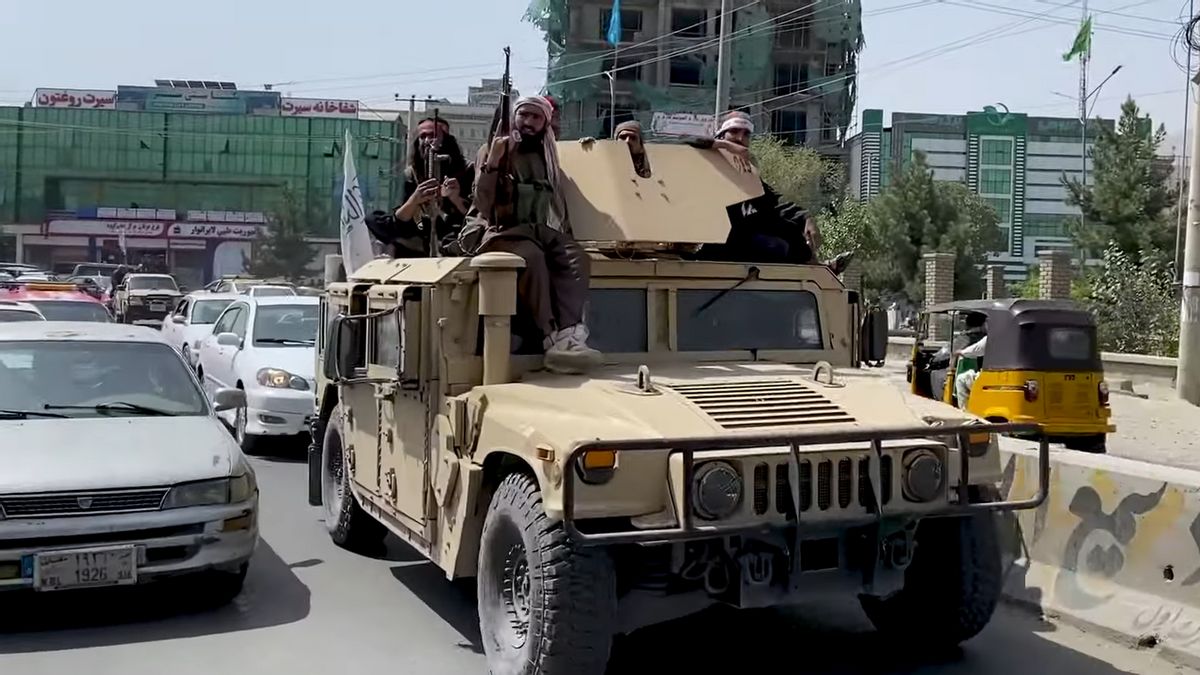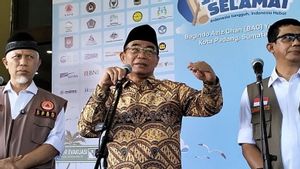
JAKARTA - The United States (US) has withdrawn its last troops in Afghanistan. US troops have been in Afghanistan for 20 years, precisely after the al-Qaeda attacks in the US on September 11, 2001. More than 122,000 people have fled Kabul since August 14, 2021, the day before the Taliban seized control of Afghanistan. US diplomat in Afghanistan, Ross Wilson, was on the last C-17 military transport flight from Kabul Airport on August 30 at 11.59pm. He was with the general commander of the US military's 82nd Airborne Division. According to the report VOI summarized in the article Last US Troops Left Afghanistan After the Massive Air Evacuation, as US troops left, the Taliban destroyed more than 70 aircraft, dozens of armored vehicles, and crippling air defenses that thwarted ISIS rocket attacks on the eve of the US departure. US Military Command Center (Centcom) commander General Frank McKenzie used the term 'heartbreak' to describe the emotions surrounding the departure of US troops from this longest war. “There has been a lot of heartbreak associated with this departure. We didn't get everyone out that we wanted," McKenzie said. US President Joe Biden's administration said it expects the Taliban to continue to allow safe passage for US citizens to leave Afghanistan once the US military withdrawal is complete. But there are concerns about how these citizens can leave if none of Afghanistan's airports are operational. There are still tens of thousands of Afghans awaiting evacuation, including translators working with the US military, journalists and women's rights advocates. It is not clear what their fate will be, but US officials fear that the Taliban may seek revenge against them. The US has said it has no plans to leave diplomats in Afghanistan and will decide what to do in the future based on the Taliban's actions. But the Biden administration also wants to see how the humanitarian and economic crisis does not break out in the country. Citing Reuters, the United Nations (UN) says more than 18 million people - more than half of Afghanistan's population - need assistance. Half of Afghanistan's children under the age of 5 are already suffering from acute malnutrition amid the second drought in four years. Several countries including Britain say that no country should recognize the Taliban as Afghanistan's government on a bilateral basis. The process of evacuating foreign nationals in Afghanistan is chaotic. They left behind thousands of Afghans who had helped them. Meanwhile the Taliban celebrated the departure of US troops. They celebrated with gunfire in Kabul. With all US troops gone, the Taliban claimed victory in a 20-year war. "The last US soldiers have left Kabul airport and our country has gained complete independence," Taliban spokesman Qari Yusuf told Al Jazeera TV. 2001 has faced a growing mission in Afghanistan, which resulted in tens of thousands of US and Afghan casualties. The futile effort frustrates the US political leadership and the Taliban, who stubbornly refuse to lose. Biden has described his decision to withdraw all US troops as a necessary option for a war whose goals are increasingly blurred. He added that the withdrawal was driven by a deal with the Taliban made by President Donald Trump. The chaos ensuing in evacuating US and Afghan nationals assisting the war effort is a predictable and largely unavoidable outcome, he said last week.

The US invasion of Afghanistan began with US President George W. Bush who vowed to eradicate global terrorism. He called on the Taliban to release hiding al-Qaeda leaders, including Osama bin Laden. When the Taliban rejected the call, he took a foothold in the war. Congress allowed US forces to pursue those responsible for 9/11 on September 18, 2001 - although lawmakers never explicitly voted to declare war on Afghanistan. On October 7, 2001, the US military officially launched Operation Enduring Freedom, with the support of from England. Much of the early phase of the war involved air strikes against al-Qaeda and Taliban targets. In November 2001, 1,300 American troops were in the country. The continuation of the war was then "legated" to US President Barack Obama. According to CNN, the top generals recommended increasing troop numbers with the aim of weakening the Taliban, where attacks were also launched at a higher level. The internal debate was lengthy and exhausting. US Vice President at the time, Joe Biden opposed the plan. But Obama is still deploying tens of thousands more troops to Afghanistan. At the same time, he committed to a troop withdrawal by 2011. Early in his second term, Obama had adopted a view of Afghanistan that his team members concluded as "Afghanistan is pretty good". This is an acknowledgment that efforts to foster western-style democracy there are hopeless. Indirectly, Obama has the opinion that eliminating terrorists and keeping the Taliban under control is the role of the US. When the US President's chair was occupied by Donald Trump, he outsourced troop-level authority to the Pentagon. His team is divided along ideological lines, between his military advisers who advocate a continued presence and staunch nationalists who oppose foreign intervention. In an August 2017 speech, Trump said that although his instincts told him to withdraw all U.S. troops, the conditions were unlikely. Trump said it was "conditions on the ground" that would dictate any decision. An agreement was reached in February 2020 that stipulated a full withdrawal of US troops in exchange for assurances from the Taliban that they would reduce violence and cut ties to terror groups. But no action has been taken to deliver on those promises, which the Pentagon says are not being fulfilled. Even as US troops began to leave, the Taliban were gaining strength. May 2021 is the deadline for withdrawing all US troops which is then passed on to the next US president, Joe Biden. Now, as of August 31, 2021, all US troops have withdrawn from Afghanistan.

Many argue that the fate of Afghanistan in the hands of the Taliban remains unclear. The Taliban has previously said it wants to form an "inclusive Islamic government" with other factions. They also plan to negotiate with senior politicians, including leaders in the previous government. In addition, the Taliban also pledged to uphold Islamic law, but still encourage women to join the government. They say it will provide a safe environment for a return to normal life after decades of war. The Taliban's road to making Afghanistan a normal life after the departure of US troops is long and not easy. According to a VOI interview with Terrorism Observer Harits Abu Ulya, there are several problems that must be resolved immediately. The first is the resolution of domestic problems. The more serious domestic problems must be resolved by the Taliban as a political and military group. The Taliban must immediately consolidate to build a government and power that is credible and accepted by all parties. The Taliban is also expected to be able to accommodate all parties who must also be involved in the development of Afghanistan. "This Taliban victory is not a victory with a complete palace. (It is like) the Taliban gets a collapsed palace and must work hard to return to reconstruction, rehabilitation. At the same time maintaining security stability so that all The desired process can be realized," said Harits when contacted by VOI. In addition, the problem that must be resolved is the economy. It should be noted that 70 percent of the Afghan people suffer from poverty and this is a serious problem. The Taliban is expected to be able to solve fundamental problems like this. Talking about economic issues, the Taliban should not be closed because there are links with international communications. This is a crucial PR for how the Taliban should open diplomatic channels to foreign countries. This is because building an economy cannot stand alone. The Taliban also have to win the trust of outside countries to get help. "Afghanistan under the Taliban (government) has tried to establish communication with China, Russia, however this is not related to ideology but more to the economy. For the Taliban this communication cannot be limited, (done) with a peaceful and inclusive spirit," Harits explained. The problem that the Taliban must also solve is security guarantees. When the US, which had invaded Afghanistan for 20 years, is gone, the social constructions and distractions remain. However, Harits assesses that the Taliban have been able to establish good communication with the factions in Afghanistan. together with the system they have," Harits explained. Regarding the image of the Taliban in the public eye which is considered extreme and conservative, Harits considered that it was all the effect of building perceptions from the media. The Taliban, which has been busy "evicting" the US and not using social media to build an image, opens up opportunities for outsiders to create perceptions about the Taliban. Whereas now the Taliban itself has been more open, for example by providing guarantees for women to go to school and be involved in government. The Taliban has also now presented various plans openly to the public. "The Taliban from 1996 to 2021 have learned how to build Afghanistan cannot be done in a very extreme way. (Afghanistan) needs public support and is more inclusive," concluded Harits.
*Read other information about TALIBAN or other interesting articles from Ramdan Febrian Arifin.
Other BERNAS
The English, Chinese, Japanese, Arabic, and French versions are automatically generated by the AI. So there may still be inaccuracies in translating, please always see Indonesian as our main language. (system supported by DigitalSiber.id)









